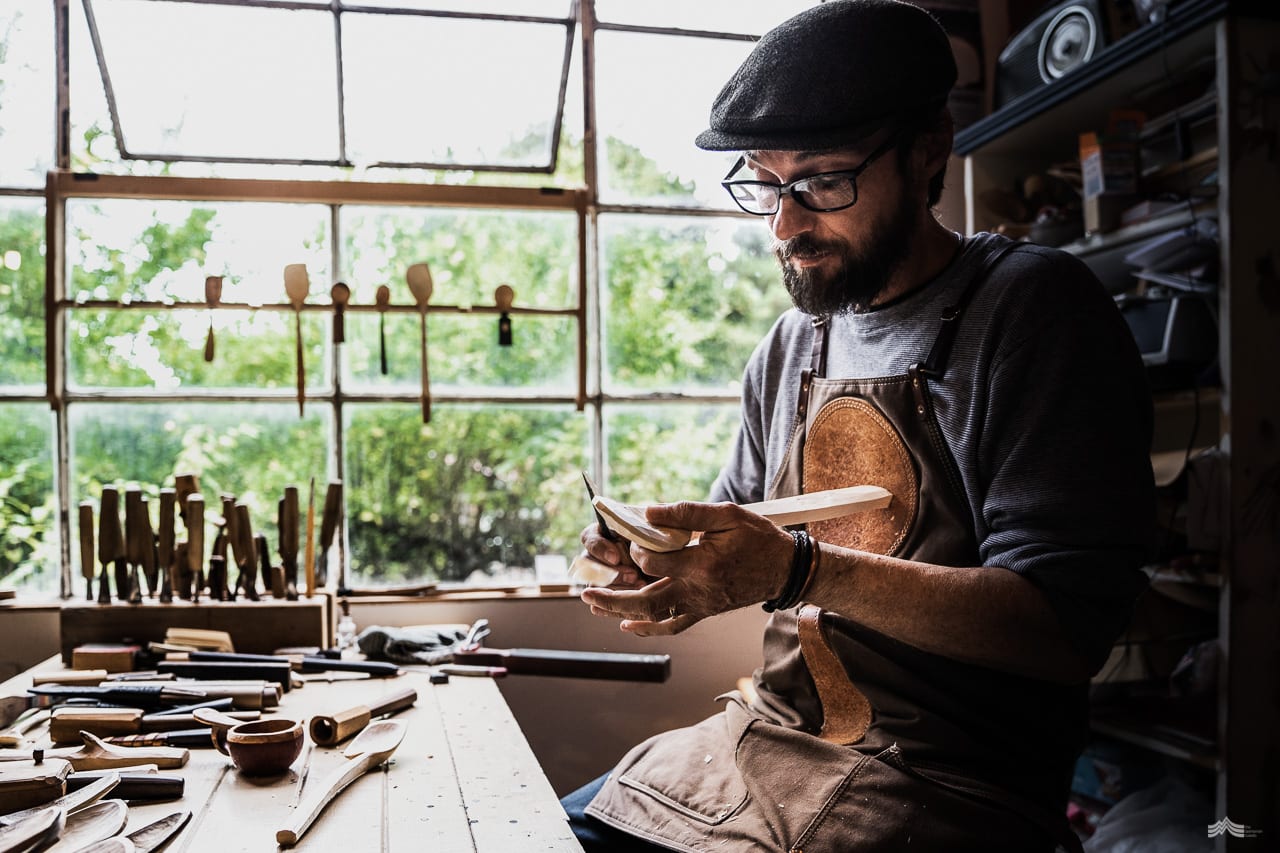Glorious afternoon light streams through an ageing wall of windows. It’s perfectly filtered by a grove of mature fruit trees beyond. Pears, apples, apricots, quinces and plums. This humble timber studio deep in the Huon Valley is David Rauenbusch’s happy place.
“It’s previously been home to other makers,” nods David. “A framer, a cabinet maker and other artists have all used the space over the years. It’s nice that it has that history.” He continues to reflect, “We’ve been here for about 18 years now and for us it’s all about lifestyle. A move from New South Wales saw us jump at the chance of securing a beautiful old farmhouse, a studio workshop and 5 acres. Sold.”
David’s previous life in Sydney saw him providing professional building advice to help property owners avoid termite damage. “It was an interesting role that took me to all sorts of jobs and various historical sites,” he explains. “Along the way I salvaged a lot of beautiful old timber and initially got into making furniture as a hobby. I just taught myself.”
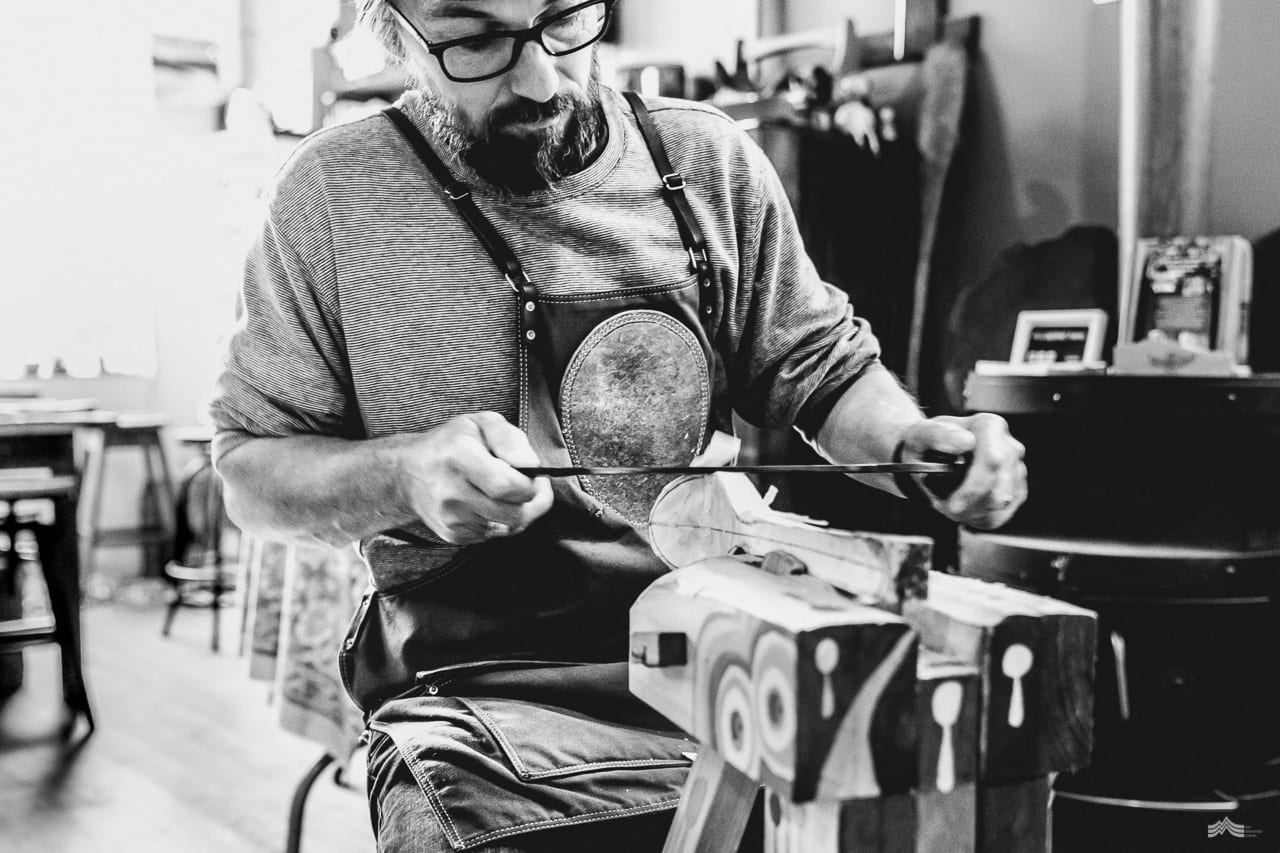
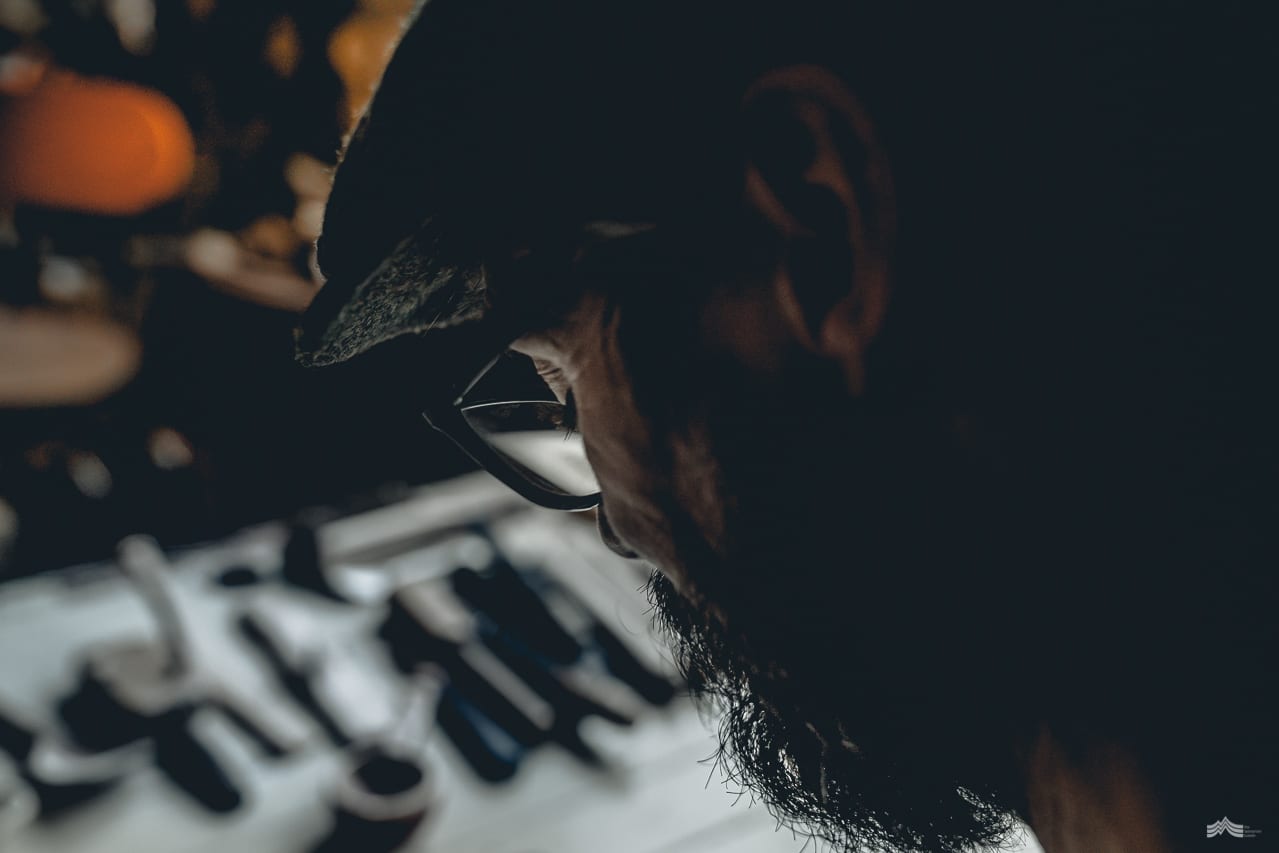
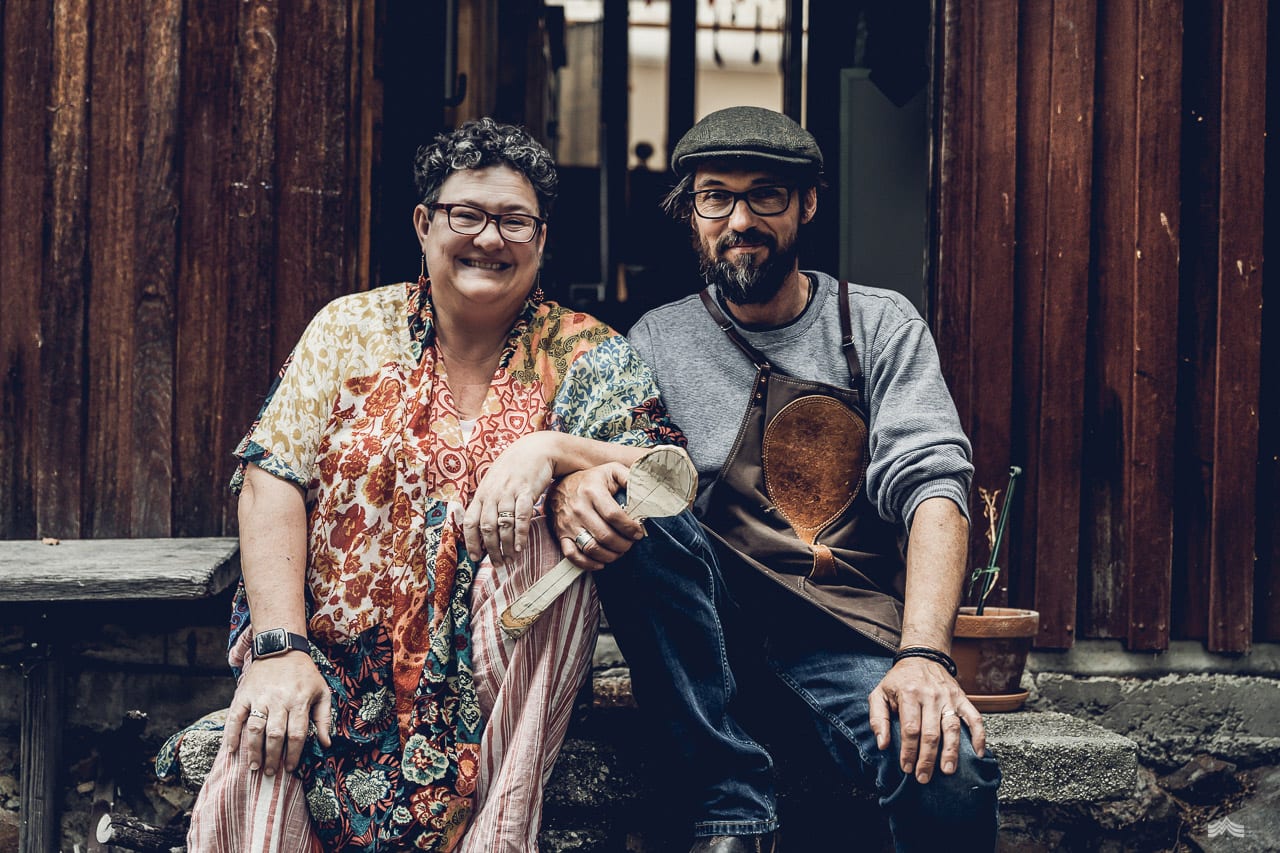
Together with wife Michelle, David began making furniture more seriously back in the late 1990s. “At the time we were on the hunt for some unique pieces for ourselves,” says Michelle. “We found it difficult to find furniture that was well made and also had some soul about it. Both of us have a passion for old buildings and over the years have collected a lot of eclectic pieces from countless Sunday drives, garage sales and auctions. We just got to the point where we just thought we’d jump in and make our own.”
That shared passion for vintage timbers and recycling saw David and Michelle embark on an adventure to make their own furniture. Under the banner of Phoenix Creations – breathing new life into old materials – this quiet and industrious pair set about crafting their own bespoke pieces. “David is a beautiful craftsman,” smiles Michelle. “We occasionally found the process of creating larger pieces of furniture for others quiet stressful. Clients sometimes have unrealistic ideas as to what’s achievable and David would work tirelessly to meet expectations that were sometimes unrealistic.”
“It’s a funny story really,” picks up David. “About seven years ago we were having an argument about something – I can’t even recall what it was about…although I’m pretty sure it would have been my fault.” He shoots his wife a cheeky grin, “Michelle joked that she’s married to a timber craftsman and she doesn’t even have a wooden spoon in the kitchen. It was something I quickly set about rectifying and the rest, as they say, is history.”
Carving that first spoon kickstarted something special. Known worldwide as ‘the spoon guy’ by a dedicated following of fans, David has mastered the art of crafting beautiful spoons with soul. “I just love it,” says David simply. “It doesn’t feel like work at all. In fact, I often feel guilty spending my week sitting out here quietly whittling away.”
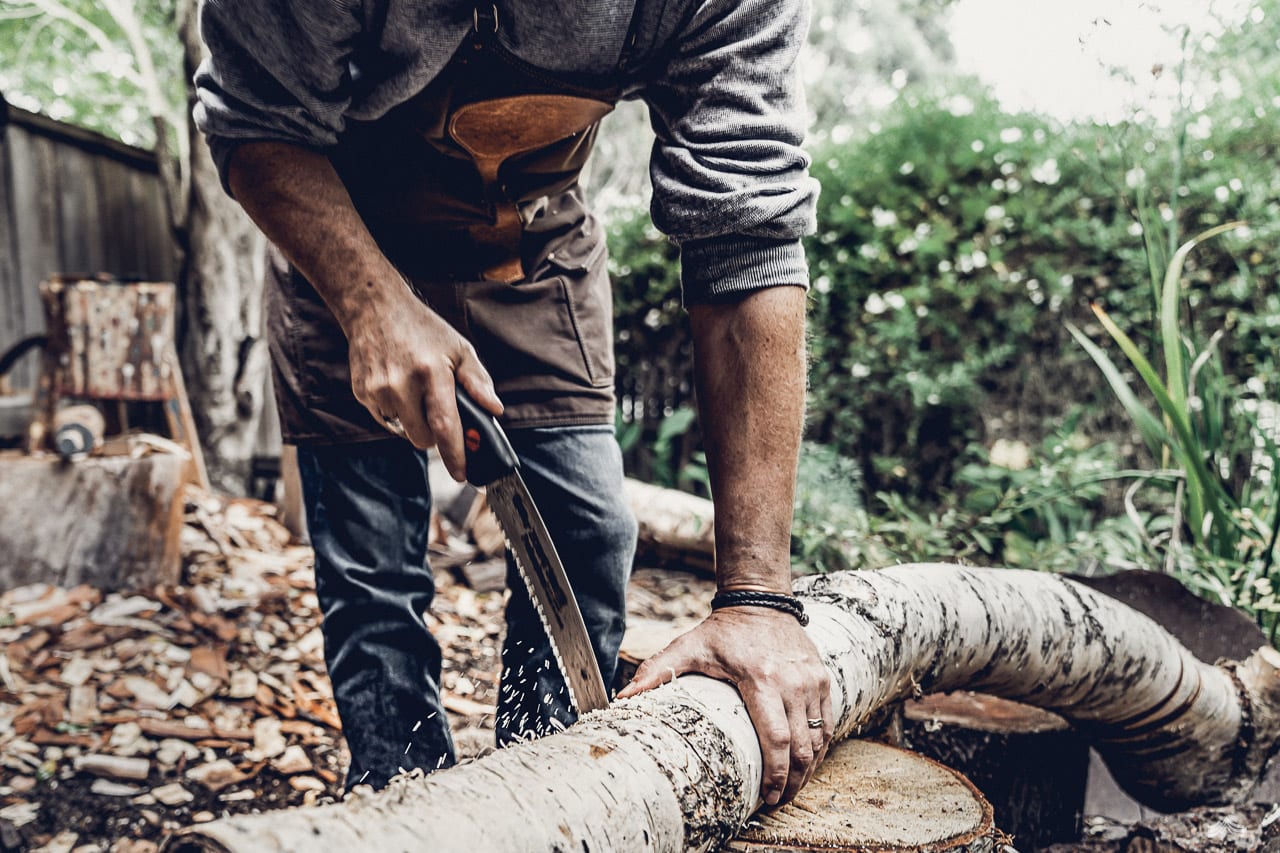
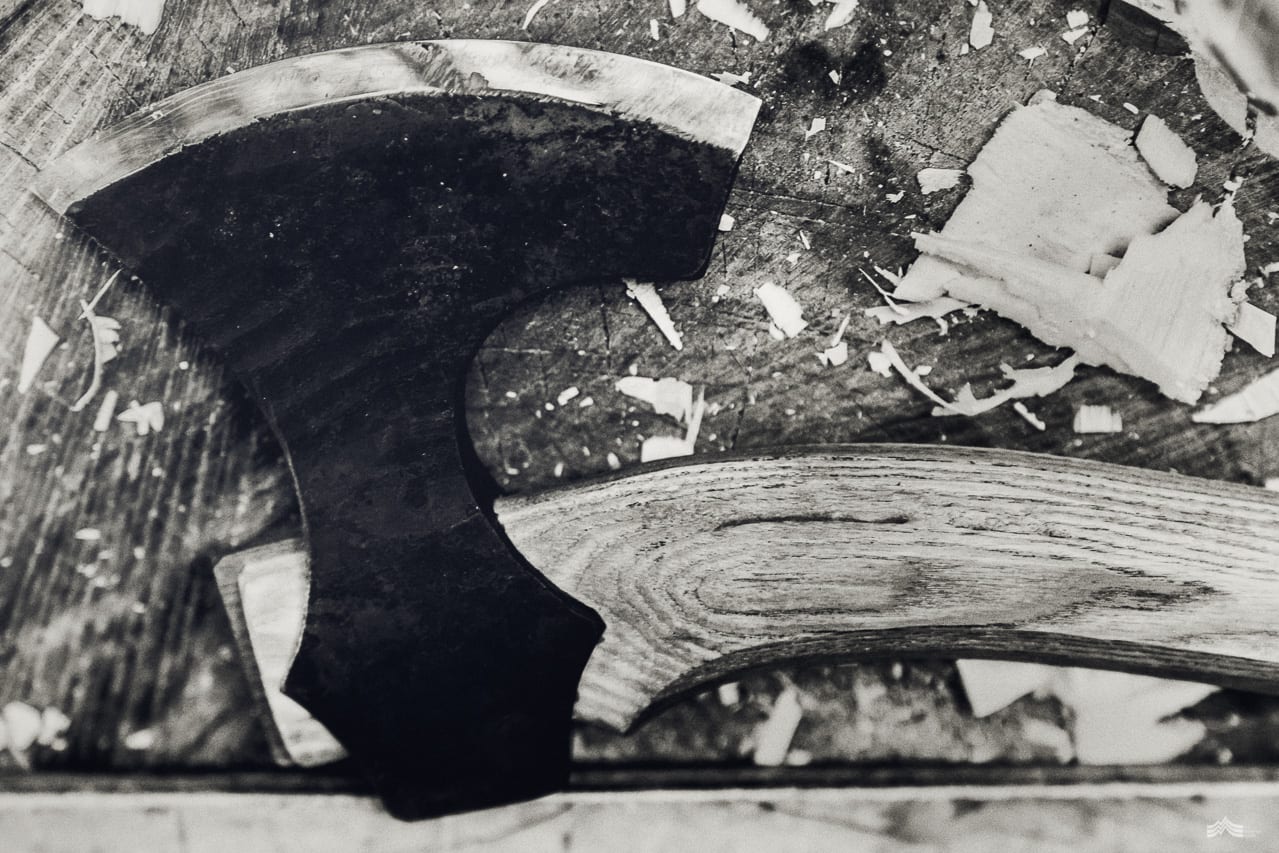
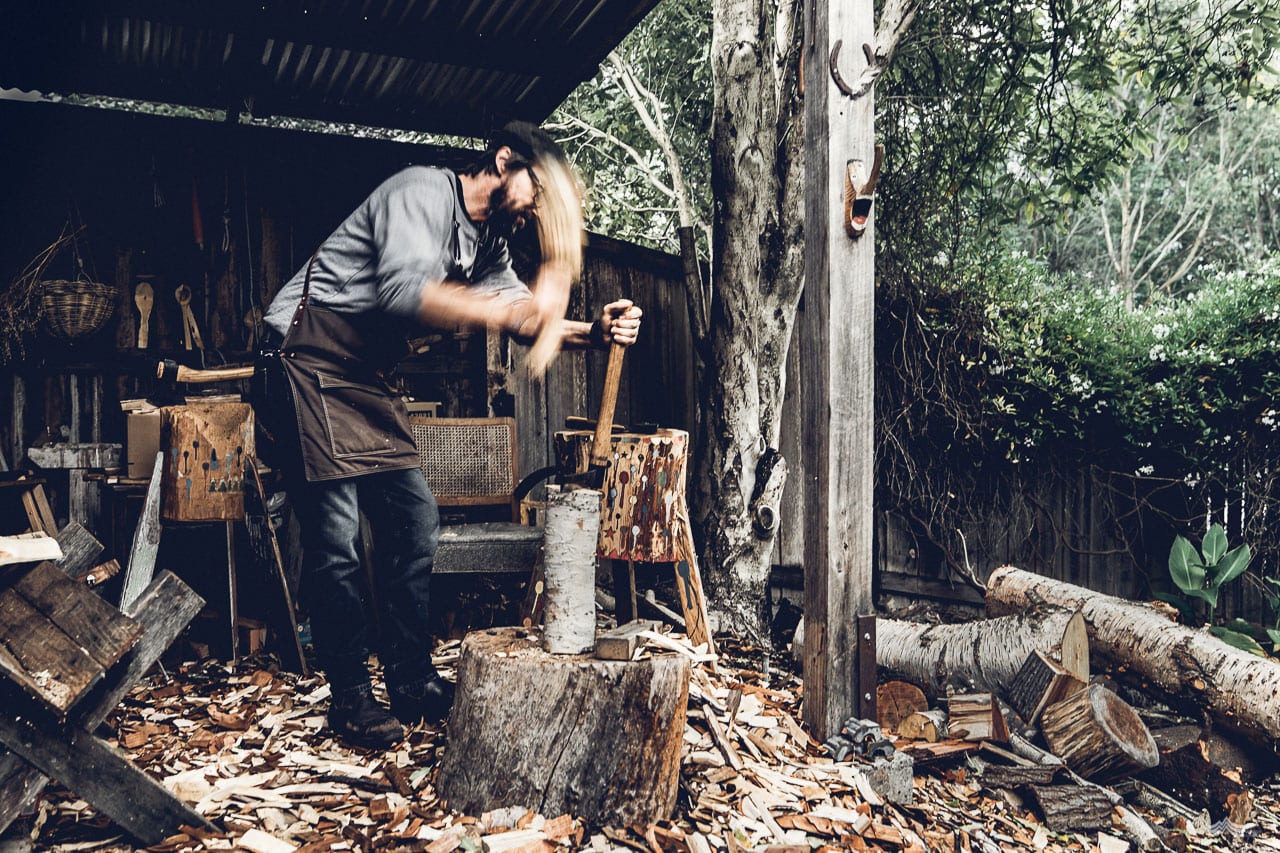
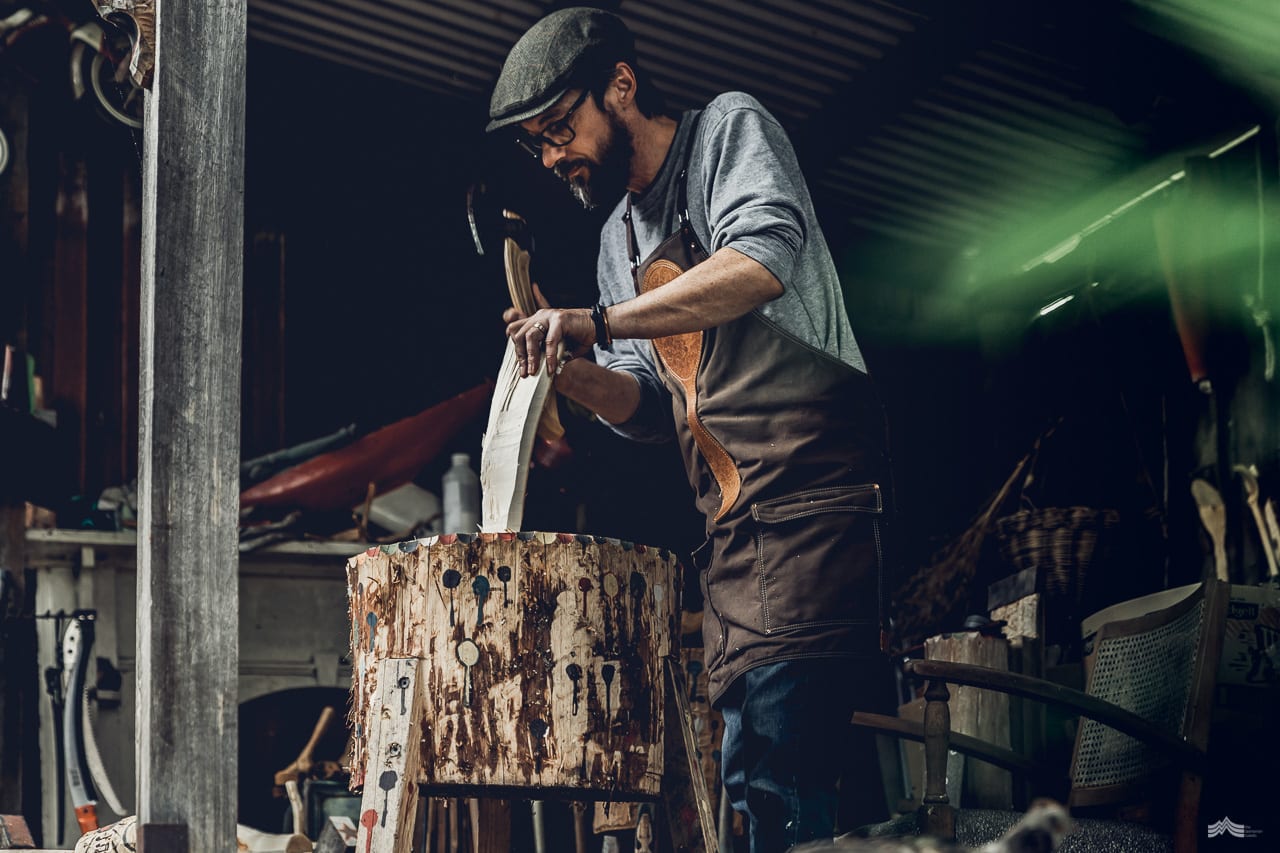
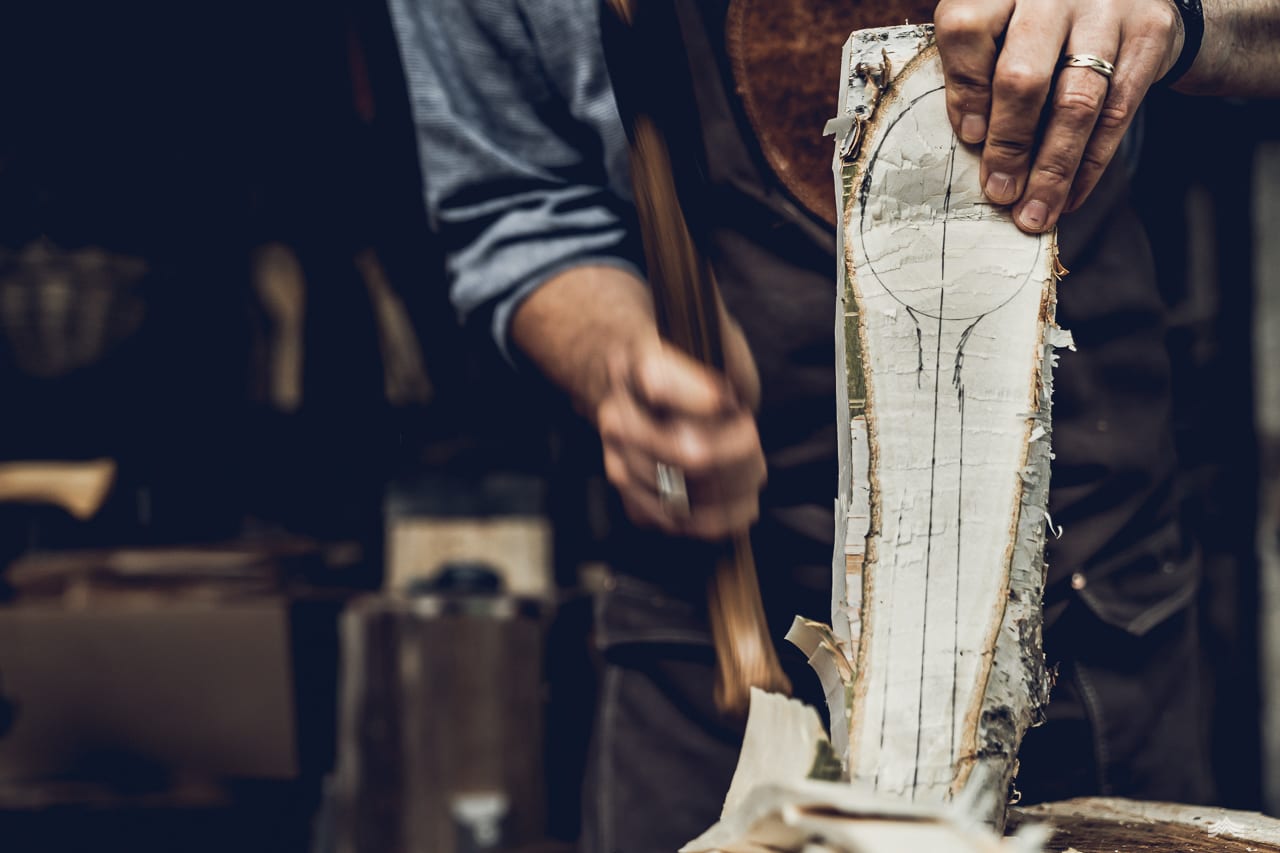
“I love creating furniture, but life is much less stressful now I’m making spoons,” agrees David. “And I still find it very rewarding. Spoons are very easy to modify, so if a client doesn’t like something, there is usually a way I can fix that without too much fuss.”
Thousands of spoons have come to life under David’s hands over the past few years. It’s a process that he has down to a fine art and one that’s mesmerising to watch in action. From selecting a piece of timber from one of his many piles scattered around the perimeter of the studio, to a beautifully shaped spoon resting on the workbench. David makes it look wondrously easy, as if he’s just running a knife through butter. “I often make about half a dozen in day,” he nods. “I get up quite early and start out here. Like most parents working from home, my day is often interrupted by family, but that’s ok…we’ve certainly made this lifestyle work for us.”
Working methodically, the rough outline of a spoon appears in just minutes. David is adept with a small axe and it’s a joy to watch him at work. Woodchips fly in all directions and the gentle clunk of metal on timber echoes across the garden. Despite the concentration etched on his face, David’s happy to have a laugh when asked if he has any tales of injury to share. “Well none of note from woodworking,” he starts, “But embarrassingly, once I took myself off on a bushwalk to Mount Anne and had a fall. A broken wrist slowed me down for a few weeks and made me realise that I am quite dependent on two functional hands.” Shooting his wife a grin from under his cap he adds, “I’ve been a bit more careful since then.”
Back in the studio, bathed in the glow of gentle afternoon light, the evolution continues. Careful shaping astride the spoon mule with a drawknife, followed by more detailed work with a sloyd knife in hand, followed by a hook knife. “David doesn’t tend to sand his spoons very much at all now,” says Michelle proudly. “He’s mastered the ability to get the same softness with the knife. It’s quite a skill and having watched him work for so long I can really appreciate it. They are techniques that have been tried and tested over the years.”
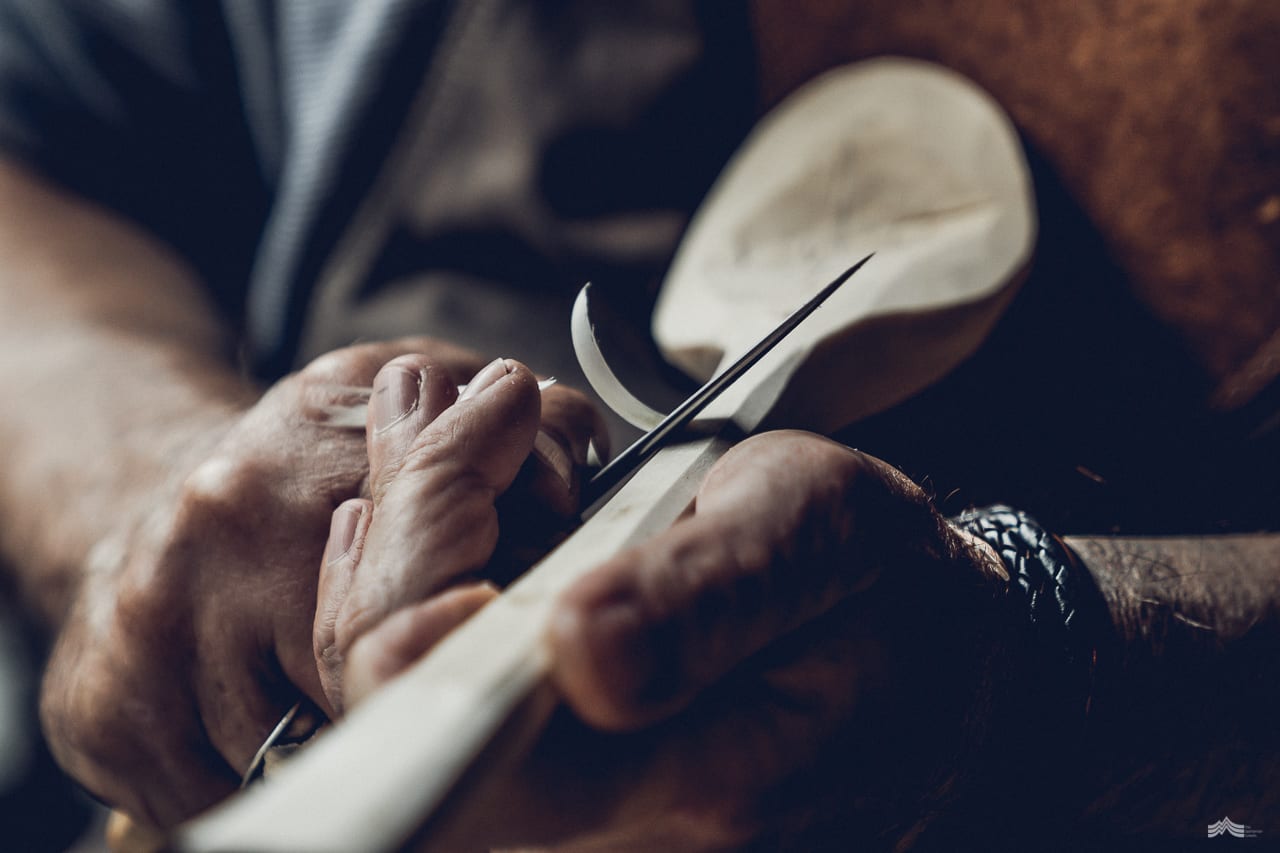
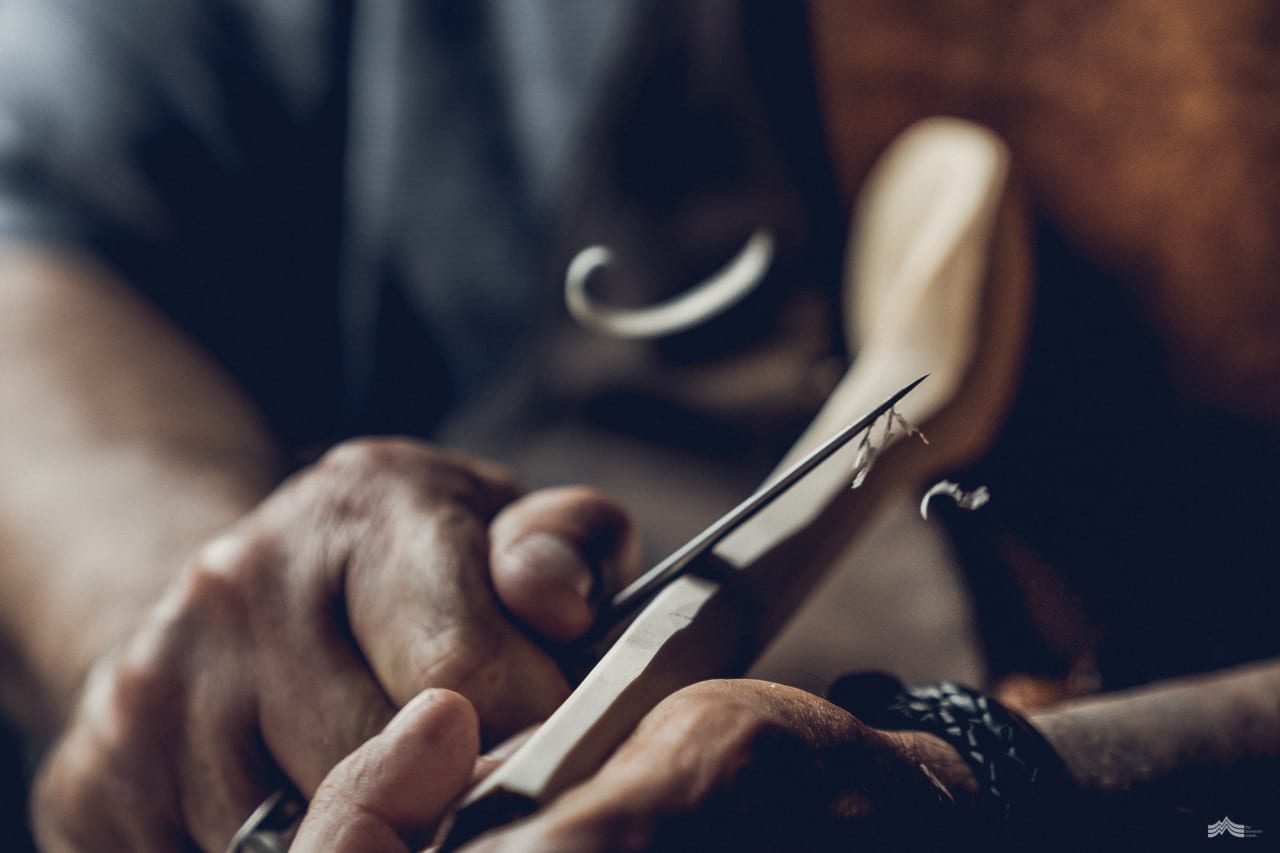
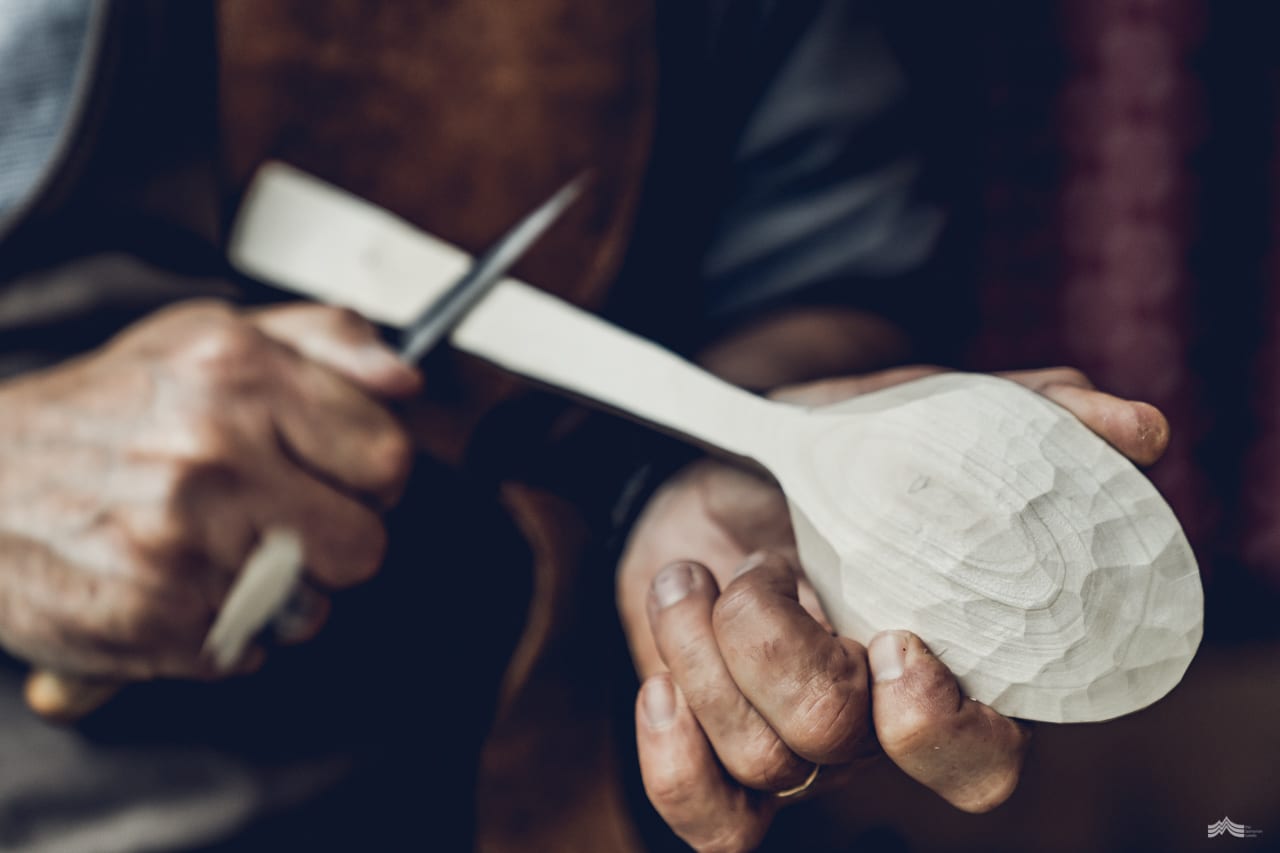
In his quiet and humble manner, David places the spoon on the workbench before him where it will rest for about a week. The time allows for any shrinkage to occur before David makes a final pass to remove any defects that have made themselves known. Then it’s time to add any colour or intricate designs in order to finish the spoon completely. The Phoenix Creations maker’s mark is a common addition to the handle.
“The paint came about after I got chatting with someone about their grandmother’s spoons. They were reminiscing about the brightly coloured spoons that used to adorn her kitchen,” recalls Michelle. “That sparked quite a journey to find a non-toxic paint we could use. David’s rainbow coloured spoons are now one of our most popular designs.”
David chats away easily as he works, “I’ve found that people are very connected to timber,” he explains. “I’m often asked about the story behind a particular spoon, people are very keen to hear the history of the wood itself.” Running a hand over a newly carved spoon, he continues, “People often hang on to special pieces of timber for years and, in fact, that’s how our spoon making classes here began as I started to have people ask if I could help them carve a spoon out of some timber that held special meaning to them. It could be a tree from their own garden, or an old piece of timber they’ve held on to for years…I’ve carved from lots of unique pieces and I like that the timber has a special meaning for its owner.”
Michelle’s background in the arts and education was the perfect platform from which to launch spoon carving workshops. “Once we got over the hurdle of insurance it has been quite smooth sailing,” she laughs. “Workshops with knives and axes, well you can probably imagine how that has the potential to be a little problematic…”
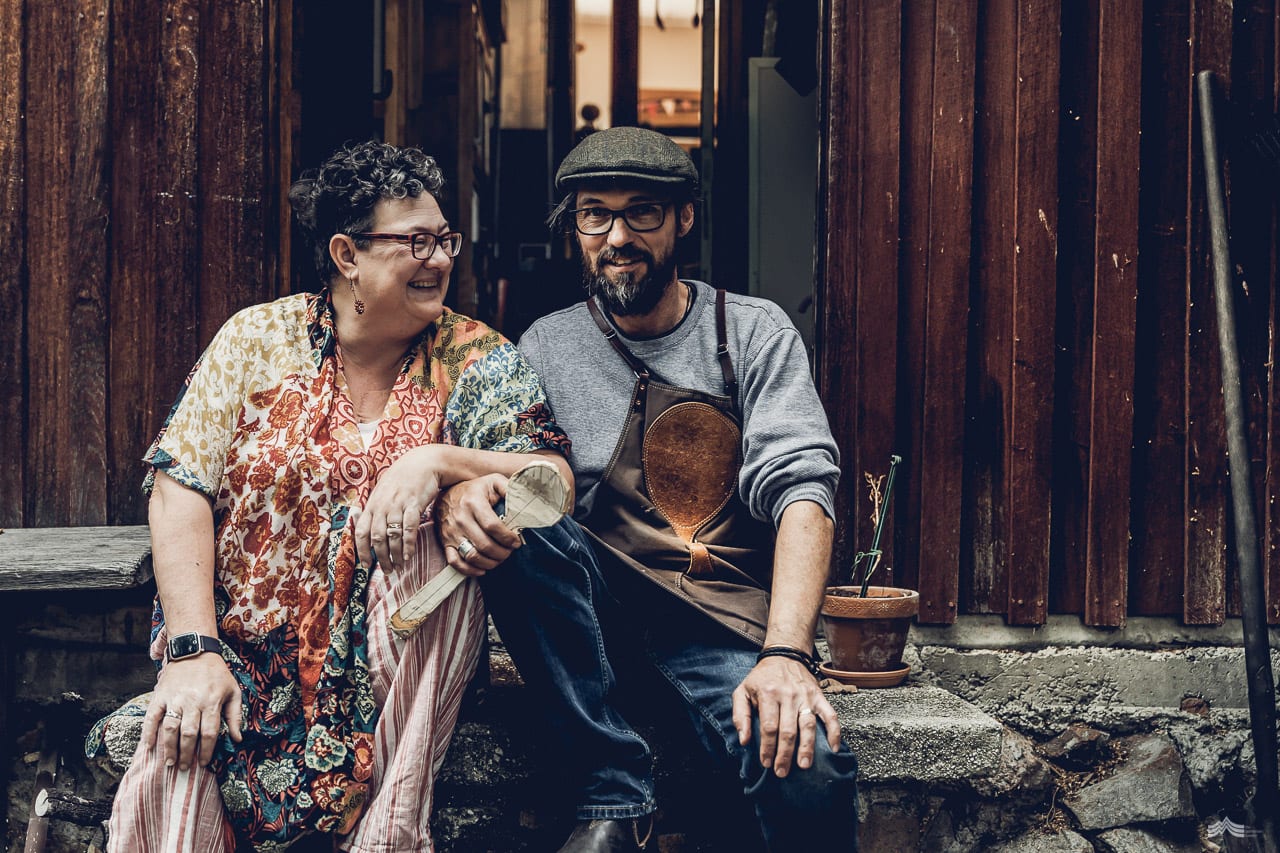
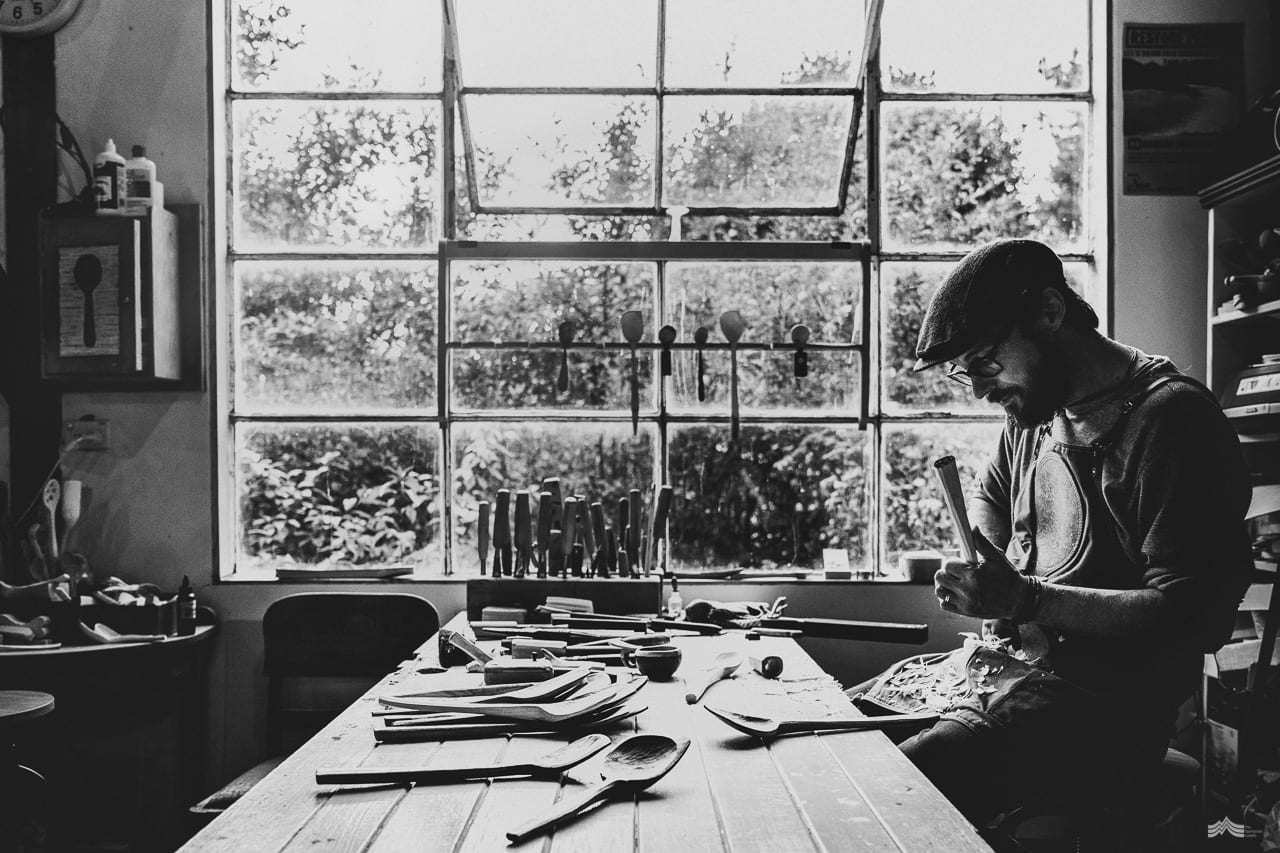
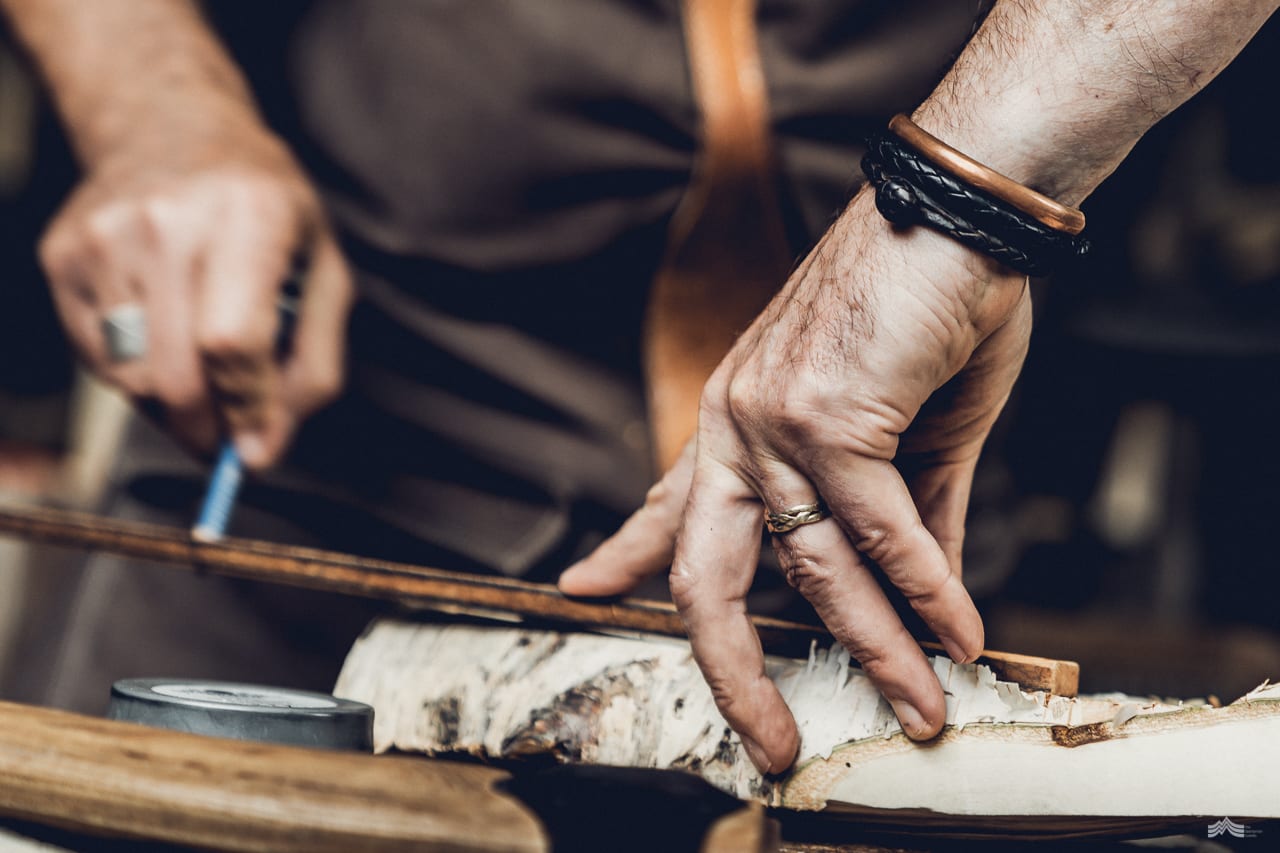
Creative days in the studio under the watchful eye of David and Michelle have gone from strength to strength. “I love that when people come here they are mindful and relaxed,” says David. “For most people the day is about slowing down and reconnecting, and that’s really nice to be a part of. A lot of stories have been shared in this studio.”
“My favourite workshops are usually the ones where we welcome different generations from the one family. I really enjoy seeing them come together…learning and creating together,” says David. “We teach everyone from the absolute beginner to those who have experience already and are looking to hone their skills. We deliberately keep the classes very small, typically just two, three or four participants so we can personalise everything.”
Michelle wholeheartedly agrees, “There’s plenty of one-on-one attention and people can ask as many questions as they like. We want visitors to have a special experience here and really enjoy their time with us. A workshop here is about immersing yourself in the process and making something from scratch.”
“It’s so nice to see the personality of each spoon evolve,” smiles David. “Whether it’s me, or someone I’m teaching, there is a real sense of accomplishment at the end of the process. Making things with hand tools is very special.”
Cooking spoons, eating spoons, olive spoons, serving spoons, scoops and kuksas. David and Michelle love playing around together with new designs and various timbers. “For spoon carving, it’s easier if the timber is green,” says David. “As you might imagine, hard and dry wood can be really difficult to carve – the greener the better for spoons.”
“If I had to choose, native cherry would probably be my favourite for carving spoons,” David reveals. “It’s my timber crush.”
David’s spoons are carved from timbers selected both for their durability and beauty. “They come from all manner of places,” he says. “Old buildings, fallen trees, fruit trees, prunings and removed trees or even furniture past its useful life. I use of lot of repurposed Tasmanian timbers too, Huon Pine, Sassafras, King-Billy, Celery-Top, Myrtle and Blackwood.” There’s usually a beautiful collection for sale in David’s studio gallery and the choice isn’t easy. “Choosing a spoon is very personal,” agrees David. “It’s a tactile experience and you need to pick them up and try them in your hand.”
Delve a little deeper and there’s a lot to consider when making what appears to be a simple, everyday item. “Timber selection is important for a number of reasons where spoons are concerned,” says David. “Obviously the timber can’t be toxic – that’s clearly not going to be good for cooking spoons or eating spoons. The feel of the timber in your mouth is also important if you intend to eat with it. We often use timber spoons at dinner parties with friends and they will remark that the food tastes different. And it does.”
“The spoon community is really quite wonderful,” smiles Michelle. “Instagram has really allowed us to connect with the world and readily share our work. We laugh to ourselves sometimes when people call in and tell us they are huge fans of ‘the spoon guy’. David has become quite well known and toolmakers now send him tools to try out which is a real treat. Sometimes I joke that he’s become a bit of a tool snob,” she laughs. “Other spoon makers look him up and drop in occasionally too. Together they share their skills whilst I enjoy talking to their other halves…we’ve come to refer to ourselves as spoon widows.”
As a flock of black cockatoos announces its presence, David reflects on the joy that the art of spoon making has given him. “It really doesn’t feel like work at all to me, so I am very grateful for that. After carving their own spoon, visitors often remark that they now understand how hard spoon making can be and that they now appreciate the process. It’s a rewarding feeling to help others learn something that continues to give me so much pleasure.”
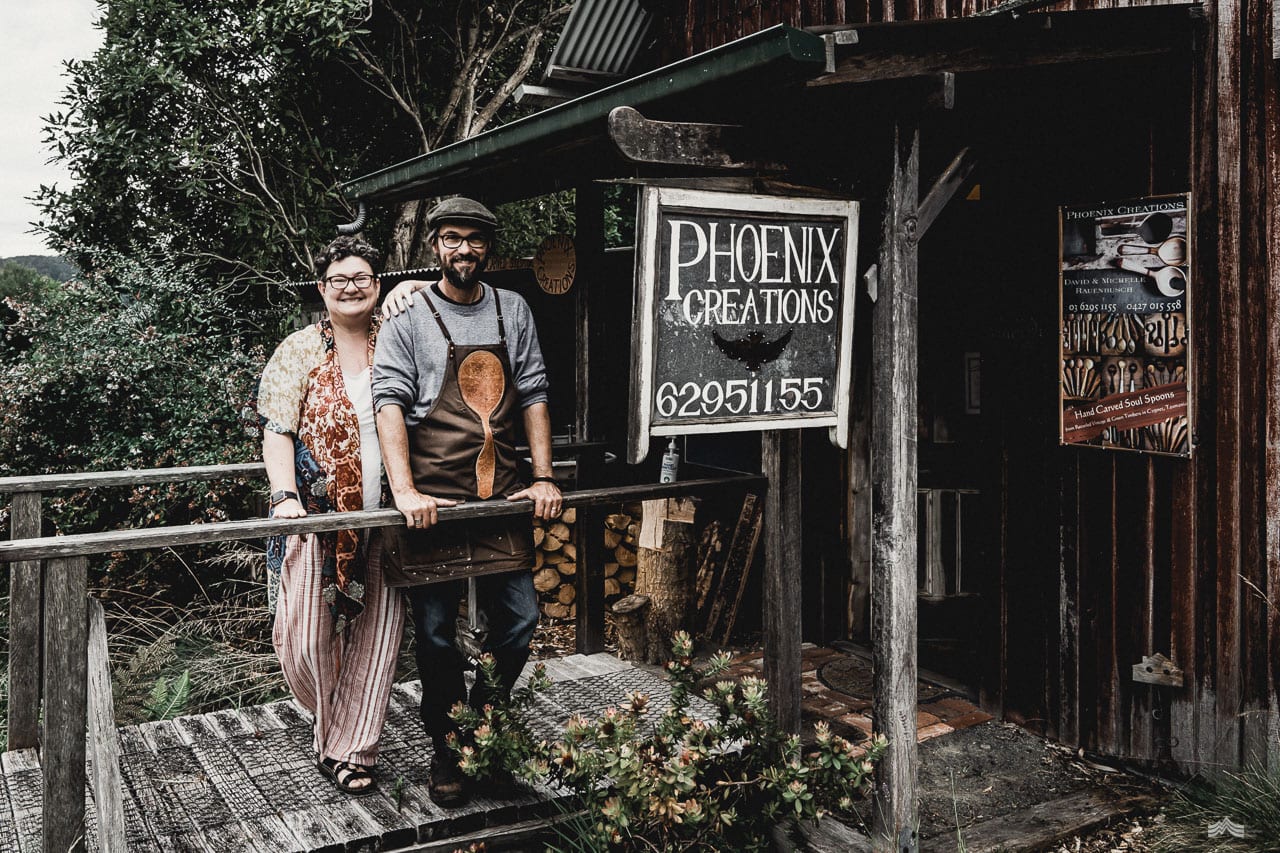
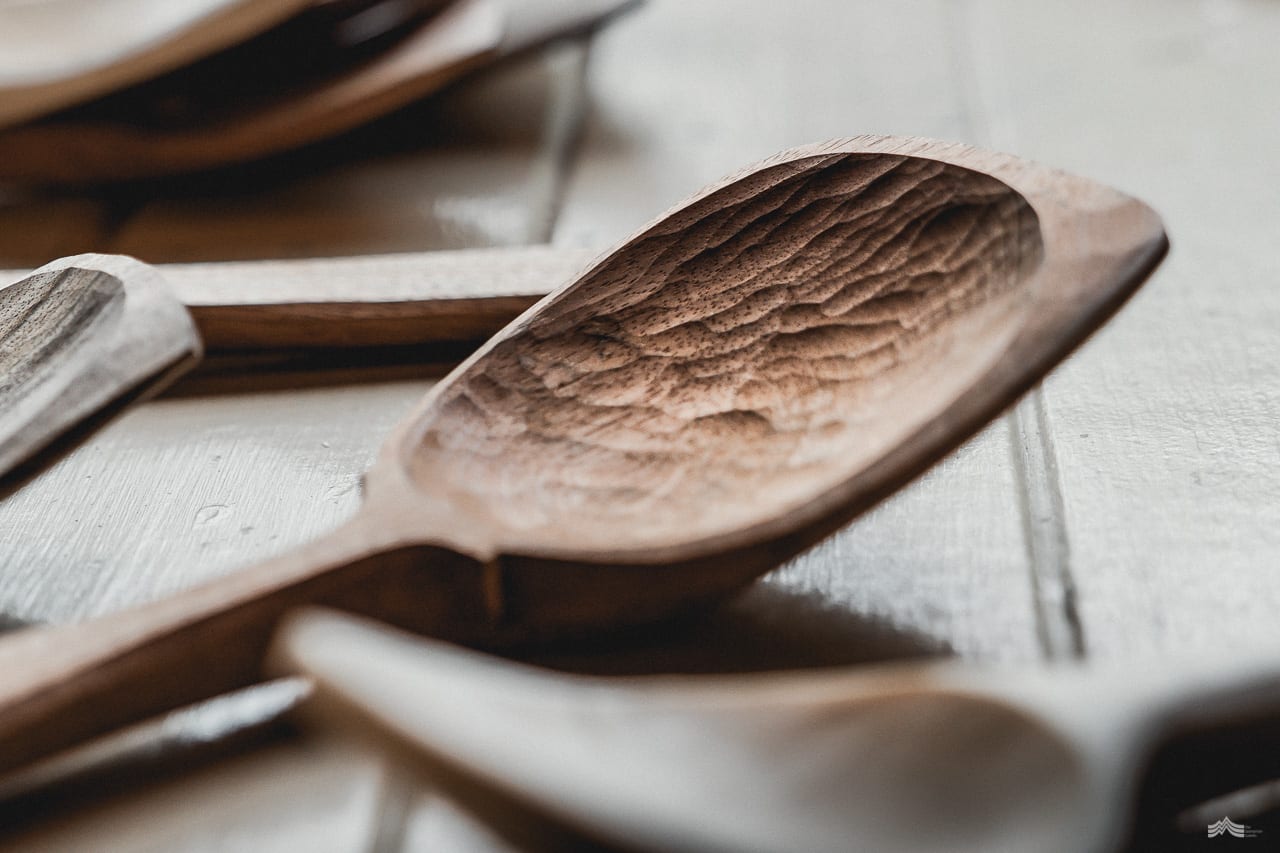
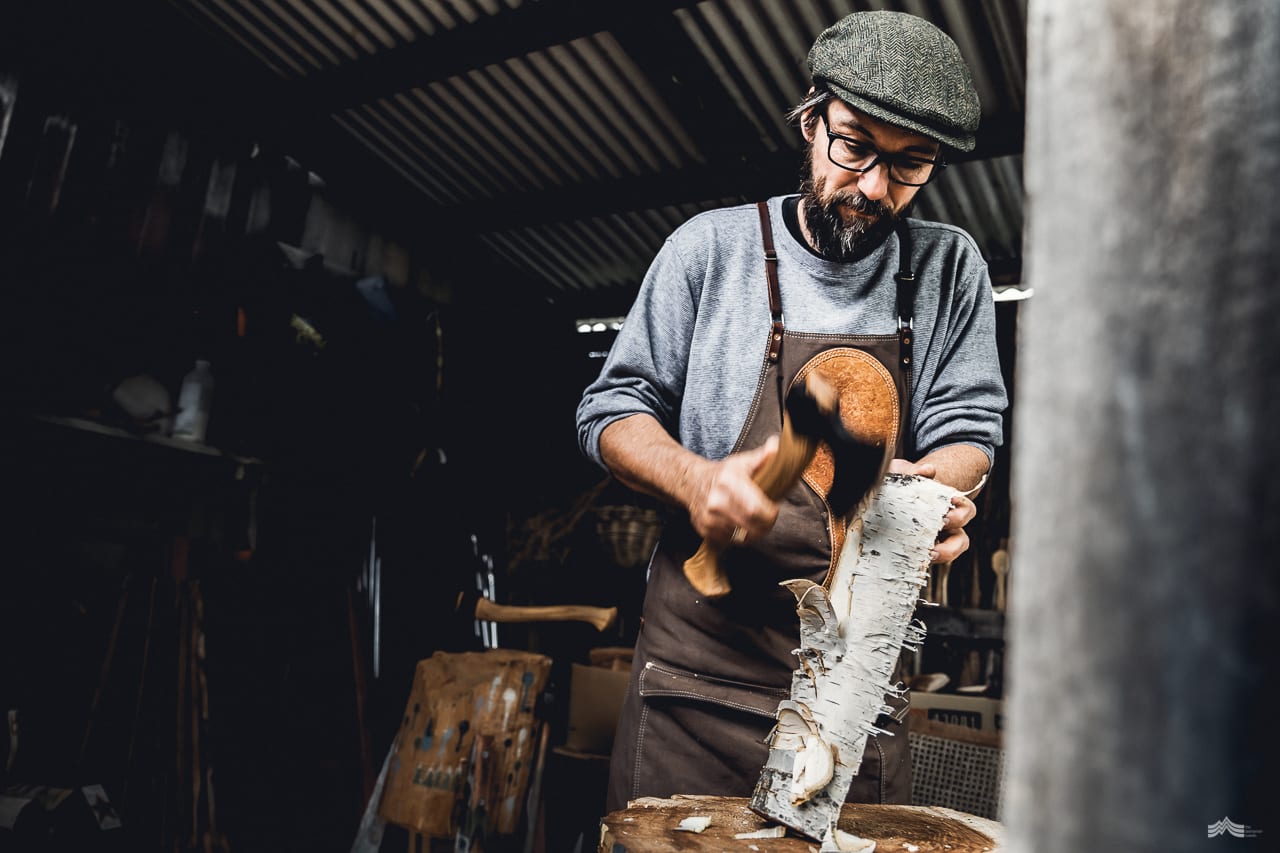
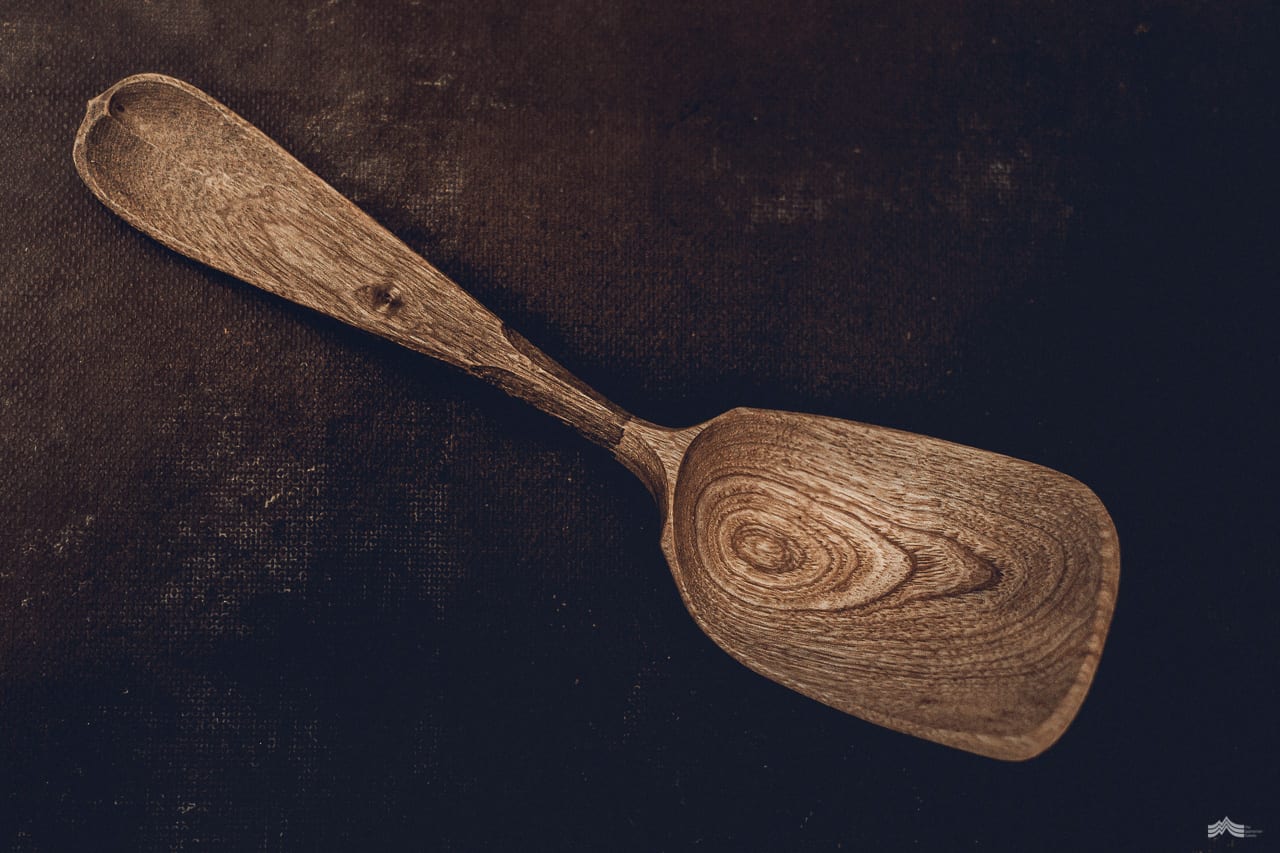
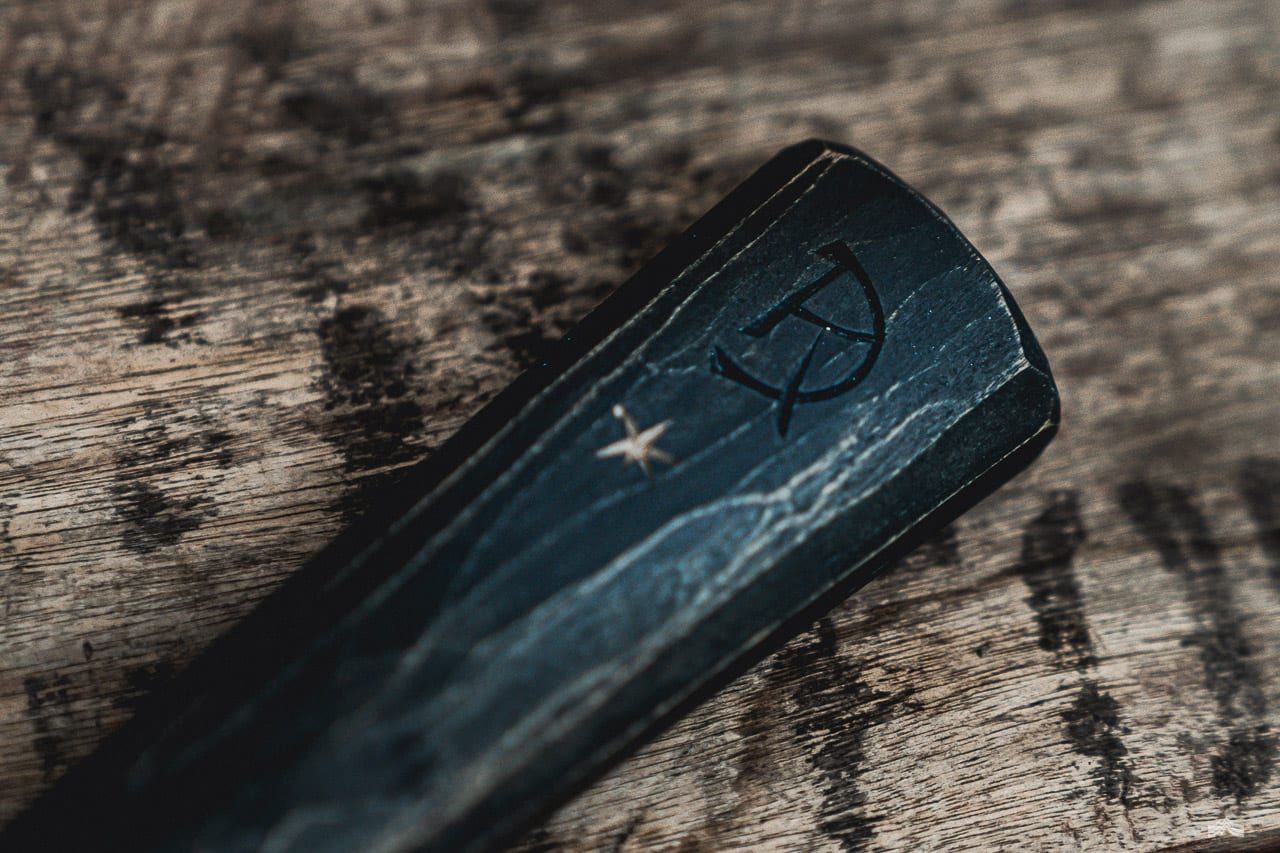
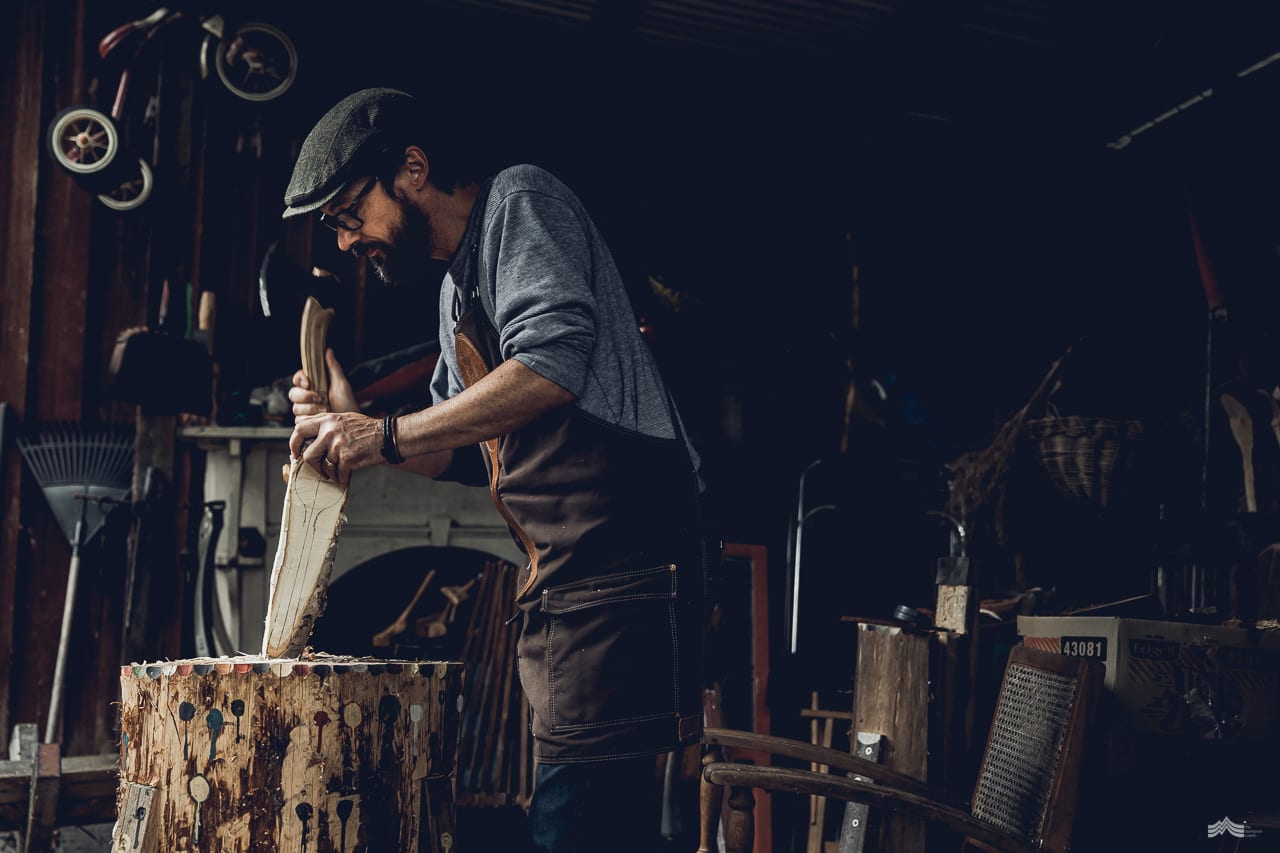
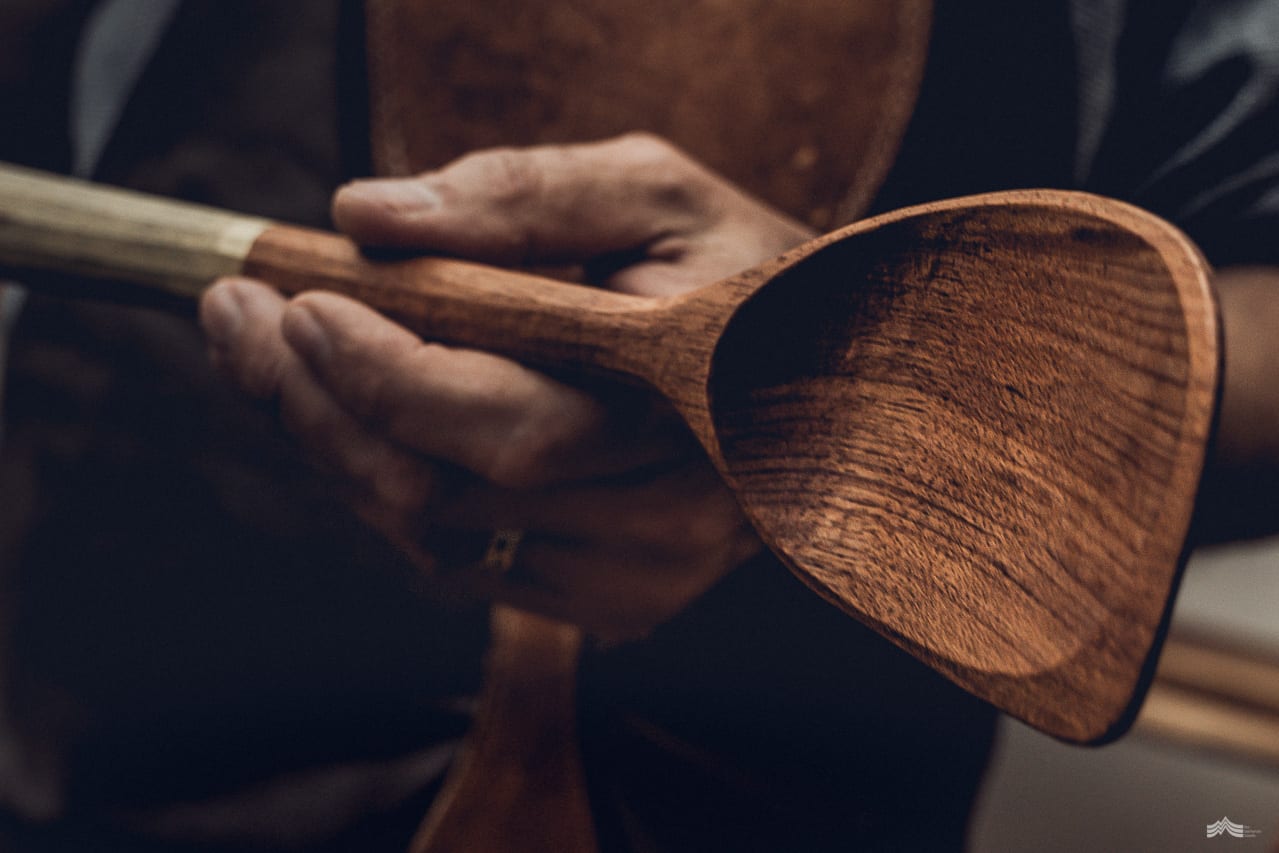
Visit the Phoenix Creations website to view David’s latest work and book in your own spoon making workshop on the outskirts of Cygnet. Follow the journey via Instagram.
